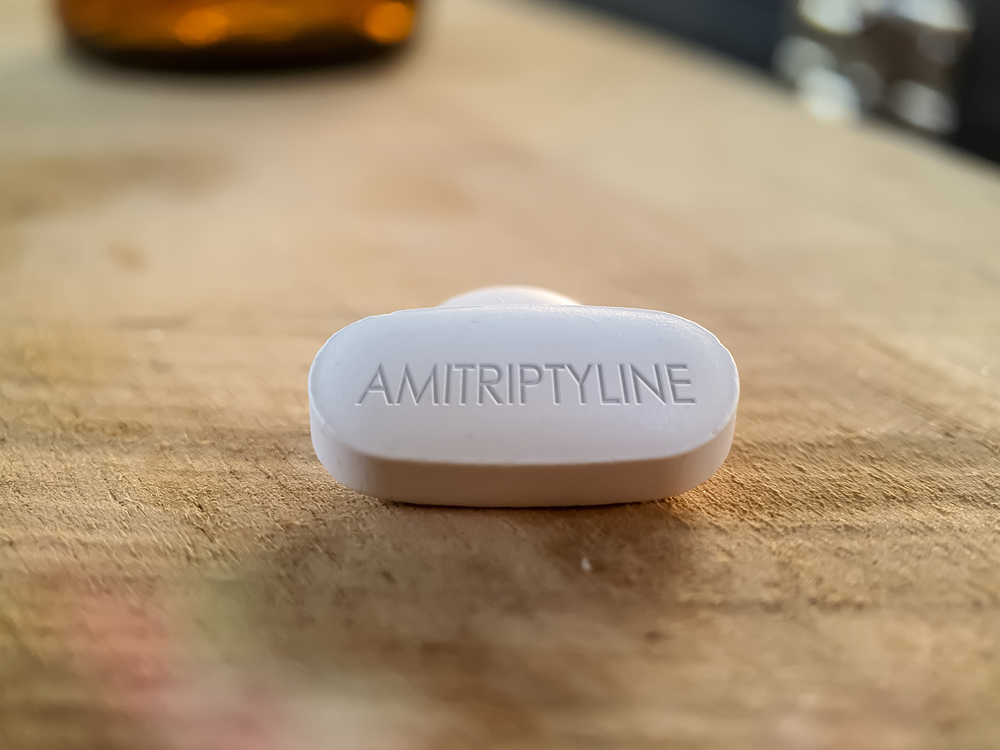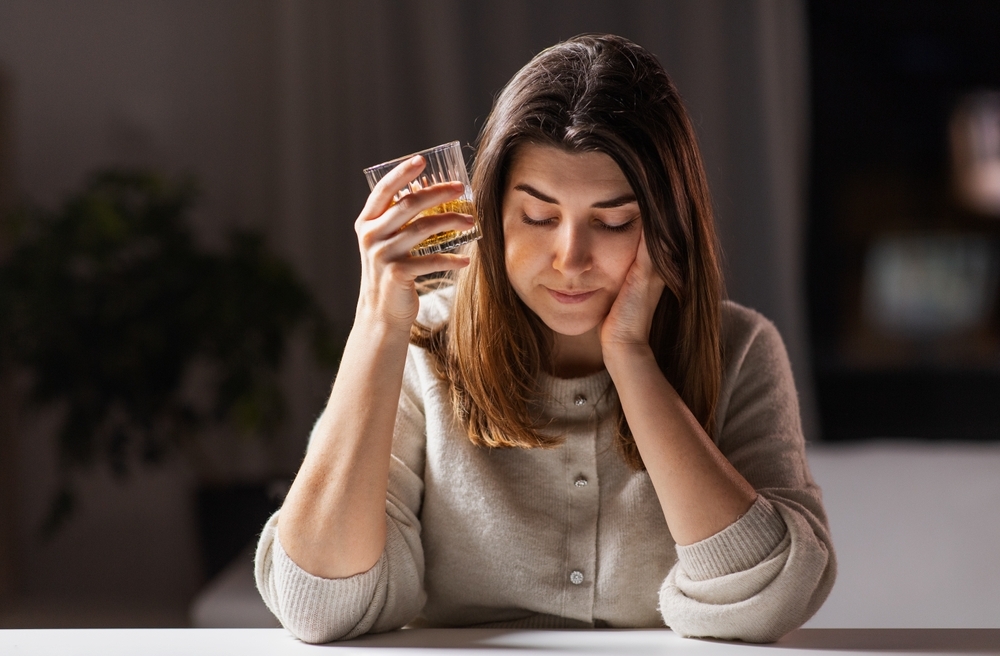Last Updated:
April 14th, 2025
What is amitriptyline?
Amitriptyline is a tricyclic antidepressant used to treat depression, anxiety and certain types of chronic pain. It works by affecting chemical messengers in the brain that regulate mood and pain perception.
Many people are prescribed amitriptyline as part of their mental health or pain management plan but it is a strong medication that requires careful use. Some people experience drowsiness and dizziness when they first start taking it and the way it interacts with other substances can sometimes lead to unexpected side effects.
One of the most significant risks comes from combining amitriptyline with alcohol. While it may seem harmless to have a drink while taking this medication, alcohol can increase side effects and, in some cases, lead to serious health risks.

Is it safe to mix amitriptyline and alcohol?
The simple answer is no; it is not safe to mix amitriptyline and alcohol. Even small amounts of alcohol can make you feel more drowsy or confused. Over time, drinking while on amitriptyline can also worsen mental health symptoms and reduce the medication’s effectiveness.
There is also a serious risk of overdose. Since both alcohol and amitriptyline slow down the central nervous system, they can lower breathing and heart rate to dangerous levels, particularly if large amounts are consumed.
If you are taking amitriptyline for depression, anxiety or pain relief, drinking alcohol can make it harder to feel the full benefits of the medication.
How does alcohol interact with amitriptyline?
Both alcohol and amitriptyline affect brain function, which is why they interact so strongly. Alcohol is a depressant that slows brain activity and amitriptyline itself also has sedative effects. When taken together, this can lead to extreme tiredness and impaired coordination making it a risky combination.
Some people find that even a small amount of alcohol causes stronger-than-expected reactions, such as feeling unusually drunk or struggling to stay awake. Others experience memory lapses or blackouts.
What happens when alcohol affects amitriptyline’s benefits?
Amitriptyline is designed to support mental health and pain relief but alcohol can interfere with its effects.
- For depression and anxiety: Alcohol may seem like it helps in the short term but it actually increases stress levels and disrupts sleep, making symptoms worse over time.
- For pain relief: Amitriptyline is often used for conditions like nerve pain or migraines but alcohol can increase inflammation and reduce the body’s ability to recover, making pain worse.
- For sleep problems: Some people take amitriptyline to help with sleep but alcohol interrupts deep sleep stages, leading to poorer rest and increased fatigue the next day.
The risks of mixing amitriptyline and alcohol long term
Drinking alcohol while taking amitriptyline might not seem like a big issue at first but regularly combining the two can have serious long-term effects.
One major concern is that drinking while on amitriptyline can lead to increased alcohol use. Some people begin drinking more frequently to manage their emotions, only to find that their depression or anxiety worsens. This can lead to alcohol dependency over time.
Amitriptyline is also processed by the liver, just like alcohol. Drinking regularly while taking this medication can put excessive strain on the liver, increasing the risk of liver disease.
There is also the risk of developing a prescription drug addiction. If amitriptyline becomes less effective due to alcohol use, some people may feel tempted to take higher doses, which can lead to dependence on the medication.
Why do people mix amitriptyline and alcohol?
There are many reasons why someone might combine amitriptyline and alcohol and in many cases, it happens without much thought. Some people are simply unaware of the risks, while others may drink despite knowing about potential side effects.
Below are some common pathways a person may find themselves mixing amitriptyline and alcohol:
Unlike some medications that cause immediate and severe reactions when mixed with alcohol, amitriptyline’s effects may not be as obvious right away. This can lead to a false sense of security, where someone continues to drink without realising the long-term risks.
Since alcohol disrupts sleep and depletes the brain’s natural chemicals that regulate mood, it can lead to increased anxiety and deeper depressive episodes the next day.
I’ve mixed amitriptyline and alcohol – what should I do?
If you have consumed alcohol while taking amitriptyline, it is important to pay attention to how you feel. Some mild side effects, such as drowsiness or nausea, may pass on their own.
However, if you experience more serious symptoms, seek medical attention immediately.
Get help if you:
- Feel extremely drowsy or confused
- Struggle to stay awake
- Have difficulty breathing
- Notice a rapid or irregular heartbeat
- Lose consciousness
If you find that you often drink while on amitriptyline or if alcohol is influencing your decisions about when to take medication, it may be time to reflect on your drinking habits.
Is alcohol affecting how you take your medication?
If you have ever skipped a dose of amitriptyline so that you could drink or if you find yourself planning your drinking around your medication, it could be a sign of alcohol dependency.
If you find yourself in this situation, one of the best things to do is take some time aside to check in on yourself. If you answer ‘yes’ to any of the following questions, it may be time to take a closer look at your drinking habits:
- Have you skipped or delayed amitriptyline so you could drink alcohol?
- Do you plan your drinking around your medication?
- Have you ignored medical advice about avoiding alcohol with amitriptyline?
- Do you use alcohol to cope with stress or emotions?
- Have you experienced withdrawal symptoms such as shaking, nausea or anxiety when you don’t drink?
- Have you tried to cut down on alcohol but found it difficult?
If these questions resonate with you, seeking support can help prevent alcohol use from escalating further.
What are the next steps?
If alcohol use is interfering with your medication or mental health, professional help is available. At Banbury Lodge, we provide specialist treatment for alcohol addiction and prescription drug addiction, helping people regain control over their health and wellbeing.
Our treatment programme includes:
- Support with detox to help you safely reduce alcohol use
- One-to-one therapy to address emotional challenges and underlying causes of alcohol addiction
- Group support to connect with others going through similar experiences
- Holistic therapies such as yoga and art therapy to support long-term alcohol addiction recovery
We understand that seeking help can feel overwhelming but you do not have to go through this alone. If you or a loved one is struggling, reach out to Banbury Lodge today to learn more about how we can support you on the path to addiction recovery.
(Click here to see works cited)
- “Amitriptyline: Medlineplus Drug Information.” MedlinePlus, U.S. National Library of Medicine, medlineplus.gov/druginfo/meds/a682388.html. Accessed 6 Mar. 2025.
- “Amitriptyline (Amitid, Elavil, Endep): Uses, Side Effects, Interactions, Pictures, Warnings & Dosing.” WebMD, WebMD, www.webmd.com/drugs/2/drug-8611/amitriptyline-oral/details. Accessed 6 Mar. 2025.
- “Common Questions about Amitriptyline for Pain and Migraine.” NHS Choices, NHS, www.nhs.uk/medicines/amitriptyline-for-pain/common-questions-about-amitriptyline-for-pain-and-migraine/. Accessed 6 Mar. 2025.
- LiverTox: Clinical and Research Information on Drug-Induced Liver Injury [Internet]. Bethesda (MD): National Institute of Diabetes and Digestive and Kidney Diseases; 2012-. Amitriptyline. [Updated 2016 Mar 1]. Available from: https://www.ncbi.nlm.nih.gov/books/NBK548410/




